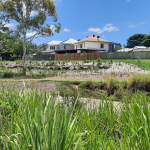Upcoming Events
Trees growing to maturity in streets and civic spaces are commonly the primary objective of urban forest strategies, with stormwater management also a requirement. These trees provide a range of high value ecosystem services, including cooling, shading and enhanced aesthetics.
Understanding the tree requirements for healthy growth is essential – particularly regarding availability of soil-based resources of water, nutrients, oxygen and suitable soil root development conditions.
In this webinar, Geoff Connellan provides an overview of approaches to passive irrigation to contribute to tree canopy targets in streets and civic spaces, and learnings from passive irrigation installations.
Topics covered include tree water demand estimation, tree water use results, system design considerations (e.g., catchment properties, inlet design, site storage, soil volume sizing and water distribution), the limitations of passive irrigation, opportunities for active irrigation and the circumstances that support structured soil systems. Reporting of stormwater system tree performance is reviewed.
This free webinar will include a short (20-minute) presentation by Geoff, followed by Q&A from attendees.
The Queensland Urban Drainage Manual (QUDM) has underwent a significant review, and a new version was launched by IPWEAQ and the Department of Energy and Water Supply on 26 October 2017. Our speaker, Sarah Hausler, was a member of the QUDM Review Steering Committee. Sarah led the redrafting of Chapter 3 of QUDM, which deals with the legal aspects of urban stormwater, including the renowned lawful point of discharge test.
The purpose, status and function of the lawful point of discharge test has been subject to some controversy. Chapter 3 of QUDM was amended in 2017 to improve the alignment between the lawful point of discharge test and the general law, with a view to making the legal content of QUDM more accessible to its users.
We are now four years on from the commencement of QUDM Fourth Edition. This seminar will provide an overview of the lawful point of discharge test and other relevant legal considerations, along with some recent case studies involving stormwater discharge.
Presenters
Sarah Hausler, Partner, McCullough Robertson Lawyers
Sarah Hausler is a specialist planning and environment lawyer focusing on water, infrastructure and environmental compliance. Her expertise is complemented by her degrees in environmental science and urban and regional planning which complement her practical approach to the commercial and policy context in which her clients operate. Sarah is the current President of the Queensland Environmental Law Association, and is on the Board of the Institute of Public Works Engineers Queensland.
Alesia Shard, Lawyer, McCullough Robertson Lawyers
Alesia is a governance, planning and environment lawyer at McCullough Robertson, focussing on planning and environment litigation, as well as infrastructure and governance advisory. Alesia has significant experience advising clients on stormwater discharge matters, including providing advice about the lawfulness of stormwater arrangements and legal options to resolve issues with those arrangements, as well as experience acting for clients in Planning and Environment Court appeals relating to stormwater issues.
Event Information
Date: 18 August 2021
- 5.00pm registration
- 5.15 pm – 6.15 pm – presentation including Q&A
- 6.15 pm – 7.00 pm – cheese board, drinks and networking
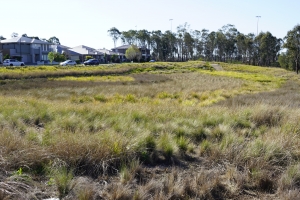
Blacktown City Council and Healthy Land and Water have recently undertaken projects to update their specifications for bioretention filter media, transition and drainage layer materials. These projects arose from (i) gaps in the science related to media configuration to achieve desired outcomes and (ii) difficulties sourcing materials complying with specifications.
While the projects produced updated specifications, the above issues remain and it has been recognised that, in order to successfully implement bioretention systems in the future, they need to be addressed.
This joint 90-minute Stormwater Queensland and Stormwater NSW event will include succinct presentations from Blacktown City Council’s Mark Liebman and Ben Penhallurick, Healthy Land and Water’s Glenn Browning, University of Melbourne’s Professor Tim Fletcher and Contech Engineered Solutions’ Craig Fairbaugh, and interactive discussions and Q&A with attendees.
Registration is $10.
A certificate of attendance can be provided upon request.
This webinar is very similar to the sold-out seminar held on 18th August 2021.
The Queensland Urban Drainage Manual (QUDM) underwent a significant review and a new version was launched by IPWEAQ and the Department of Energy and Water Supply on 26 October 2017. One of our speakers, Sarah Hausler, was a member of the QUDM Review Steering Committee. Sarah led the redrafting of Chapter 3 of QUDM, which deals with the legal aspects of urban stormwater, including the renowned lawful point of discharge test.
The purpose, status and function of the lawful point of discharge test has been subject to some controversy. Chapter 3 of QUDM was amended in 2017 to improve the alignment between the lawful point of discharge test and the general law, with a view to making the legal content of QUDM more accessible to its users.
We are now four years on from the commencement of QUDM Fourth Edition. This webinar will provide an overview of the lawful point of discharge test and other relevant legal considerations, along with some recent case studies involving stormwater discharge.
Presenters
Sarah Hausler, Partner, McCullough Robertson Lawyers
Sarah Hausler is a specialist planning and environment lawyer focusing on water, infrastructure and environmental compliance. Her expertise is complemented by her degrees in environmental science and urban and regional planning which complement her practical approach to the commercial and policy context in which her clients operate. Sarah is the current President of the Queensland Environmental Law Association, and is on the Board of the Institute of Public Works Engineers Queensland.
Alesia Shard, Lawyer, McCullough Robertson Lawyers
Alesia is a governance, planning and environment lawyer at McCullough Robertson, focussing on planning and environment litigation, as well as infrastructure and governance advisory. Alesia has significant experience advising clients on stormwater discharge matters, including providing advice about the lawfulness of stormwater arrangements and legal options to resolve issues with those arrangements, as well as experience acting for clients in Planning and Environment Court appeals relating to stormwater issues.
Event Information
Date: 21 October 2021
Time: 12:30 – 1:30pm (AEST)
Registration is $10.
A certificate of attendance can be provided upon request.
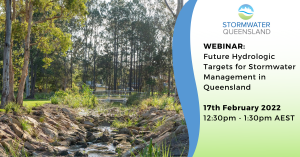
Healthy freshwater streams rely on may factors that are strongly influenced by hydrology and not related to water quality. The Healthy Land & Water Blueprint for Improving Waterway Management (2020) advocates for a change to the SPP to introduce new targets such as flow controls to reduce detrimental impacts from urban flow increases.
Tony Weber, one of the authors of the blueprint, will discuss why such targets are needed to protect Queensland’s waterways. He will also review the development and application of hydrological targets for stormwater, currently taking place in other states and how such targets can be assessed.
Carl Tippler will also cover ecological requirements of streams and their links to hydrology, along with some case study examples.
This 1-hour webinar is hosted by Stormwater Queensland and will include presentations from Tony and Carl, followed by Q&A with attendees.
Proof of CPD will be provided to attendees upon request to Stormwater Queensland.
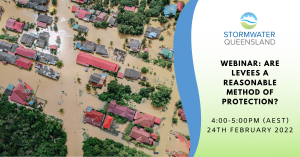
The recent January flooding in Maryborough, saw the failure of a temporary flood barrier, that caused a change in the emergency management of the township. Designing, constructing and maintaining levees are important to ensure they can be used as a means of flood protection. We have brought together a panel of international (Netherlands) and local (Queensland) professionals, to get a glimpse into their experiences and then open the floor to your questions.
This 1-hour webinar, hosted by Stormwater Queensland, will include presentations from Dion Jones, Christian Huising and Brendan Wallace, followed by a Q&A with attendees.
Cost $15 – Proof of CPD will be provided to attendees upon request to Stormwater Queensland.
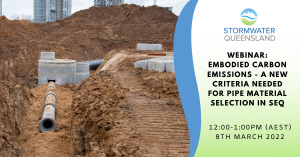
This webinar seeks to disrupt the current method of selecting a pipe where only constructability, durability and cost are considered. New criteria, embodied carbon and operational energy, must be considered in order to reduce the environmental impact of pipeline, sewerage and drainage projects.
The presentation uses a method of calculating embodied carbon emissions of approved materials, rather than proposing new materials. Therefore, this tool can be used to reduce carbon emissions immediately, at a critical time for climate change and contributes to an analysis, that will assist water utilities in South-East Queensland (SEQ) to make informed decisions about which approved pipe materials have the least embodied carbon emissions.
This 1-hour webinar is hosted by Stormwater Queensland and will include presentations, followed by Q&A with attendees.
Cost $10 – Proof of CPD will be provided to attendees upon request to Stormwater Queensland.

franc.sydney 2022 is powered by Stormwater NSW and is all about challenging the rationality of current practices and perceptions of urban stormwater and its management. It is a community of individuals and organisations who are, in some way, connected to or effected by urban stormwater and are passionate about changing the way the industry operates to become more future-focused, resilient, adaptive and connected.
The stormwater industry has, for decades, tried to shift the balance between vested interests and the greater good, but it has become clear that it can’t do this alone. So franc.sydney 2022 brings together individuals from beyond stormwater to tackle this issue together. Our members include professionals, scientists, academics, researchers and advocates that recognise the need for change, the need to put the long-term prosperity of the health of our waterways, emissions and sustainable development above short-term political and financial interests. Most importantly, we bring these people together to help us all speak with one voice.
And it all begins by having ‘franc’ discussions.
This conference has a total of seventeen (17) guest speakers (up from the traditional four), and will include a range of new topics including:
- How to develop resilient communities.
- The relationship between the environment and human health.
- Finding ways to help protect our aquatic environment and conserve biodiversity; and
Conversations between scientists, planners, hydrologists, environmentalists and academics to ensure we are all on the ‘same page’ going forward.
Franc.Sydney has also moved to become a hybrid event giving everyone the opportunity to be a part of franc either in person or from the comfort of your own home. In-person and virtual registrations are exchangeable at the rate you paid (early bird, standard) if you are to change your mind closer to the date.
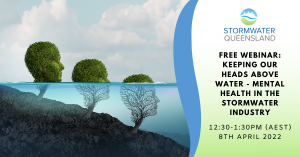
Do you find the your work is affecting your mental health? Was that 20th drainage re-design one too many? Do you feel as though your clients still don’t care about water quality outcomes, even in 2022?
Come along to this panel discussion to hear from some diverse voices who’ve been there and seen that. This event aims to proactively review the pressures of mental health, uniquely to stormwater professionals, and how we can work together to overcome them as an industry.
This free 1-hour webinar is hosted by Stormwater Queensland and will include presentations, followed by Q&A with attendees.
Proof of CPD will be provided to attendees upon request to Stormwater Queensland.
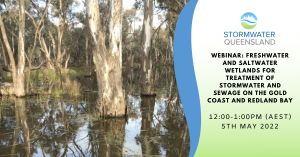
South East Queensland is one of Australia’s fastest-growing areas and has the challenge of managing growth while protecting significant natural waterway assets and environmental values.
This webinar will highlight case studies on the Gold Coast and Redland Bay where stormwater treatment measures are being used to manage this issue by offsetting point source sewage loads. Importantly, the presentation will describe how stormwater, riverine and tidal flows will be treated by proposed constructed freshwater (one being of the order of 50ha) and saline (one being of the order of 20-ha) wetlands and how ‘other’ catchment based stormwater management measures (concrete drain reconstruction, bioretention systems etc) fit into the ultimate solution.
The webinar will describe the journey taken in scoping, evaluating and arriving at the anticipated solutions, outline the details of works proposed and describe expected implementation activities. The webinar will include a presentation from Tony McAlister, followed by Q&A with attendees.
Proof of attendance can be provided to attendees upon request to Stormwater Queensland.




